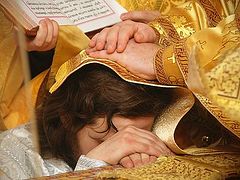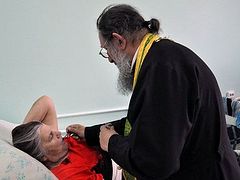But we are bound to give thanks always to God for you, brethren beloved of the Lord, because God has from the beginning chosen you to salvation through sanctification of the Spirit and belief of the truth.
2 Thessalonians 2:13
How unto salvation? By sanctifying you through the Spirit. For these are the things that are the efficient causes of our salvation. It is nowhere of works, nowhere of righteous deeds, but through belief of the truth.
John Chrysostom
Perceiving
Imagine for a moment a priest wandering through the halls of a hospital, searching for a patient-parishioner. Unbeknownst to the priest, the patient-parishioner had been moved to another room. The priest believes the patient was in room 212. He knocks, is invited in, and enters. And there on the hospital bed before him is someone he does not know.
The surprised patient looks at the priest. The equally surprised priest looks at the patient. A moment of inconvenience passes. The priest has to make a choice; it is either “Oh excuse me, wrong room” or “Hi, I’m Father Nectarios, and I just wanted to drop in and see how you’re doing.” The former is a quick exit, no doubt befuddling the never to be seen again patient. The latter is a decision to engage and accept the risks and not appear to be a lost priest.
Opting for the latter, the priest met a wall. “What do you want?!”
At this point, I do my best circumstantial speech routine, saying, “I just happened to be in the area and thought I’d drop in. You know, to see how folks are doing.” I add, “And see if I can be of any support.”
The response was, “I’m in the [expletive] hospital, how do you think I’m doing? And I don’t need a priest in my room.” Again, a choice: exit or engage. I chose to engage.
Expressing my reassurance, “Oh, worry not, I often go places I’ve never been. How are you holding up?” I walked further into the room. The unknown patient appeared surprised he’d not scared me away.
“Well, if you must know...” and the patient proceeded to explain his sicknesses, ailments, medical procedures, and family. I listened. Then I asked, “And what is the long-term prognosis?”
“The long-term prognosis? Padre, in the long run, I am going to die!” He was severe and unforgiving. We looked at each other, and I said, “You know what?” Then I deliberately paused, and I waited. It did not appear he was going to answer, and finally, after what seemed an eternity, the unknown patient said, “What?”
I replied, “So am I. I, too, am going to die.” Again there was silence, and then the patient began to laugh. His laughter was not without pain. We shared a moment of joy.
“You’re not so bad, Padre.”
“Thank you. And you seem to be on the mend.”
A steel sternness came across the patient’s face, “On the mend? You want to switch places?”
I answered, “Oh, now you want to wear my cross?”
We laughed again.
I said, “You know, Sir, you’re doing pretty well. You’ve got some mending to do. But at least you’re looking forward—to home and family.”
“I’ve got a good family.” The patient began to cry. “And I love my family.”
I looked directly into his eyes, “Family is the greatest gift you can have. A family is everything. And it is a good reason to get well and go home. God gave your family to you or, perhaps, you to your family.”
After another awkward pause, “You’re right, Padre. I still have time to make a change in my ways. I hope I do.”
“You can. Just tell your wife and children you love them. It is a good place to start. That’s all they need to hear. Just tell them you love them.” We were both crying.
“Padre, you know what? I can do that,” he said with stern determination.
“I know you can.” With that, I shook his hand and said, “Sir, you get some rest. I will get out of your way.” And I began to walk out of the room.
When I reached the door, the voice from the bed said, “Ain’t you even going to say a prayer?”
I turned around, “Sure, if you want me to.”
“Just keep it short.” I did. Then I left the room.
Pursuing
Over a decade ago, an Orthodox Christian priest and I were attending a conference, well away from our homes. We were the only Orthodox priests in attendance. Add to this, our parishes were distant from each other, and it was not often that we had an opportunity to be together.
Finally, being in midwestern America, there are few Orthodox Christian parishes. Thus, seeing an Orthodox priest in this particular town in mid-America was an unusual sight.
It was not until the last night before the conference was to end that we finally had time to sit alone in the hotel lobby and spend time together. Wearing our cassocks and pectoral crosses, we were animatedly talking and also receiving an occasional glance from other patrons. We looked different. But as we spoke of family, experiences, joys, and trials, we offered comfort and counsel to each other, and by our presence gave witness of our faith to others.
It was late in the evening when a tall gentleman walked into the lobby. Crossing our path, he looked directly at us and seemed pointedly puzzled. We paid little regard. He spoke to the hostess, and then a second time crossed our path, again focusing on the two of us.
The man left the building, walking outside to make a phone call. He returned to the lobby, again glancing at us.
Finally, he walked up to our table and asked, “Excuse me, are you Orthodox priests?”
We replied, “Yes, we are.” The emotion on his face became a look of elation backed up with relief. He asked, “May I talk to you?”
Not knowing what was behind his question, we acceded to his request and offered him a chair. There were tears in his eyes as his story unfolded.
“Fathers, I need your help. My wife is Orthodox, and we live in the northern part of the state, about 70 miles from the nearest Orthodox church. My wife has cancer, and tomorrow she’s undergoing surgery. Well, before we left home, the priest was going to visit and give her a blessing. The priest could not make it. And we’re scared.”
One of us asked of nature cancer, and he explained. “The cancer is in her spine. It’s inoperable. And if we do nothing, she will die. To save her life, tomorrow morning, the doctors will remove a part of her spine, just above and below the area of cancer. My wife will be unable to walk for the remainder of her life.”
We were stunned. “How old is your wife?” The husband informed us. If memory serves me correctly, she was in her mid-30s.
Father asked, “Where is your wife?” The man said, “In the hotel across the parking lot (from our hotel). We said, “Let’s go see your wife.”
The man asked for a moment, saying he wanted to call his wife and let her know he’d found two Orthodox priests and said he would drive us to the hotel. We offered to walk across the extended parking lot, but he would not have us walking. He departed the lobby.
I looked at the priest across the table, and we were both speechless. I asked, “Do you have a Euchologion (Book of Needs) with you?” The reply came back, “No.” I did not either. Then I recalled that I had it on my Kindle, an electronic e-reader. I ran to my room to retrieve it.
The man drove his car to our hotel. We got in and he drove across the parking lot to his hotel. During those couple of minutes, he kept saying, “My wife is happy. She cannot believe there are two Orthodox priests—not one but two Orthodox priests—coming to bless her.” Again, he repeated how their priest was well over an hour’s drive from their home and could not make it before they departed a couple of days ago. And now, their prayers had been answered.
We entered the hotel lobby and went up the elevator, down the hall, came into a room, and the husband burst out, “Sweetheart, I told you I’d found two priests.”
His wife rose from her bed, despite our protestations to the contrary, and greeted us. We spoke for a while. She confirmed the nature of cancer, the radical procedure, and added, “I know I will be confined to a wheelchair or worse, and my mobility is going to be very limited. But all I want to do is live long enough to see our daughter graduate from high school.”
Everyone’s eyes were filled with tears. She asked if we could pray for her.
That night we said the prayers for the Mystery of Holy Unction. The silence, solemnity, and joy overwhelmed each of us.
The night was late, probably well after 10:00 P.M. We asked the time of the surgery. It was scheduled for 4:30 A.M. the next morning. Six and one-half hours before the surgery, she received the anointing in preparation for a life-changing procedure and an opportunity for life—mortal and eternal.
Protecting
In the course of a Sunday Divine Liturgy, it was evident a new person was standing at the back of the nave. Albeit an elderly woman, she was resolute.
At liturgy’s end, I greeted her, and we spoke. Olga had a remarkable story to share.
During the Brezhnev years, Olga and her family were expelled from the Soviet Union. She and her husband were both scientists in fields related to nuclear power.
Olga shared how she and her husband had struggled in America—struggled to find employment commensurate with their education. They’d labored on the edge of poverty, accepting work well beneath their abilities hampered by barriers of language. Her husband had died many years previous. And now she stood before me.
After the initial conversation, I inquired what was bringing her to the parish. She replied, “Father, I need you to pray for me.”
“Okay, of course. Am I praying for a specific reason?”
“I have pancreatic cancer.”
Somewhat stunned, I asked, “What stage?”
“Stage 4.”
It was Olga who stood firm. I had to steel myself. “Have the doctors given you a timeframe?”
She lowered her head. “Six weeks, maybe two months.”
“Olga, you didn’t take communion. Please let me give you communion.” And I attempted to guide her forward toward the iconostasis.
But Olga pulled back and said, “No, Father. I can’t.” She planted her feet.
I said, “Yes, you can. Please come with me.”
“No, Father, I can’t.” She was unmovable.
“Why not?”
“Father, I have never been baptized.”
“Never been baptized? I’m sorry I don’t understand.”
“Father, my parents were members of the [Communist] Party. They could not baptize me.”
That was an answer I never anticipated, much less experienced.
My immediate reply was, “We can fix all of that right now.”
Within the following minutes, Olga received the Holy Mysteries of Baptism, Chrismation, the Holy Eucharist, and Holy Unction. We all celebrated.
Olga came to church periodically. She always stood in the same place. She always took communion.
And then she did not come anymore.
Two years after her baptism, I went one last time to her home. Knocking on her front door, I received no reply. I’d almost given up and was ready to depart when I heard an exterior door open beneath the carport. As I walked toward it I was abruptly greeted by a tall, rather burly man, with an accent. He looked at me and said, “Oh, it’s the priest.”
I introduced myself and asked if I could see Olga. The gentleman turned away, motioning for me to follow, and asked if I spoke Russian. I told him I did not. He shook his head and said, “She’s only been speaking Russian for the past few weeks. She’ll not be able to talk with you.”
I entered the living room, and an unconscious Olga lay in a hospital bed. Her head was leaning toward her left shoulder. The hospice attendant’s smile was my sole greeting.
I pulled a chair up next to the bed and prayed as I held her right hand. Minutes passed. It was quiet. Here laid before me the woman who’d told me, two years earlier, she had six-to-eight weeks to live.
After a while, Olga turned her head toward me and opened her eyes. I said nothing. She looked at me with her still vibrant blue eyes, focusing, and said, “Oh, Father Nectarios, thank you for coming!” The hospice attendant turned toward us, evidently surprised.
Again, Olga expressed her thanks. I asked her how she was holding up.
Olga said, “Father, I am tired.”
“Yes, Olga, I understand.”
“Father, why did God let me live so long?”
“Olga, He had something for you to do.”
Olga thought for a moment, then said, “I hope I did it.”
“Olga, I am sure you have done all He has asked of you – and probably more.”
“I hope so.”
“Olga, may I give you communion?”
“Yes, Father, please.”
After receiving communion, Olga struggled in her weakness to bless herself.
My final words to Olga were, “Olga, you rest, and I will sit with you.” Her head again drifted toward her left shoulder, and she closed her eyes. I remained for a while, praying before I left.
Olga fell asleep in the Lord just over twenty-four hours later.
Finally...
Apostolicity—the apostolic priesthood—is more than a defined-genealogical inheritance and the laying on of hands by an apostolically-ordained bishop. Apostolicity is also sacred phenomenology, “the first-hand experience of God”i and His working in our apostolic priesthood and the lives of His people. Such phenomenology is experiential and difficult to express in verbiage. One has to be attuned to it when it occurs. Most only become attuned to it in the rear-view mirror, after it’s happened – and only if they are seeking him. Sacred phenomenology is not within our capability to control.
The man in the hospital bed perceived it when the priest ventured into the unknown. The man whose wife had cancer pursued it by seeking a blessing for his wife, while the priests followed, and the wife welcomed and believed in God's grace. And Olga, when first present in church and ill, sought to protect the Holy Mysteries and their sanctity by proclaiming, rightly, that she had yet to have the first doorway opened to receiving their divine nature.
Apostolic phenomenology is a conversion experience—the real image of God. It is not something that occurs once but repeatedly. It is our Orthodox Christian mystical heritage transcending ritual structures and narratives through the generations. It ought to be treasured. It must be protected.
Therefore, brethren, stand fast, and hold the traditions which you have been taught, whether by word, or our epistle.
2 Thessalonians 2:15
To which course many nations of those barbarians who believe in Christ do assent, having salvation written in their hearts by the Spirit, without paper or ink, and, carefully preserving the ancient tradition.
Irenaeus of Lyons
Hence it is manifest, that they did not deliver all things by Epistle, but many things also unwritten, and in like manner both the one and the other are worthy of credit. Therefore let us think the tradition of the Church also worthy of credit. It is a tradition, seek no farther. Here he shows that there were many who were shaken.
John Chrysostom




